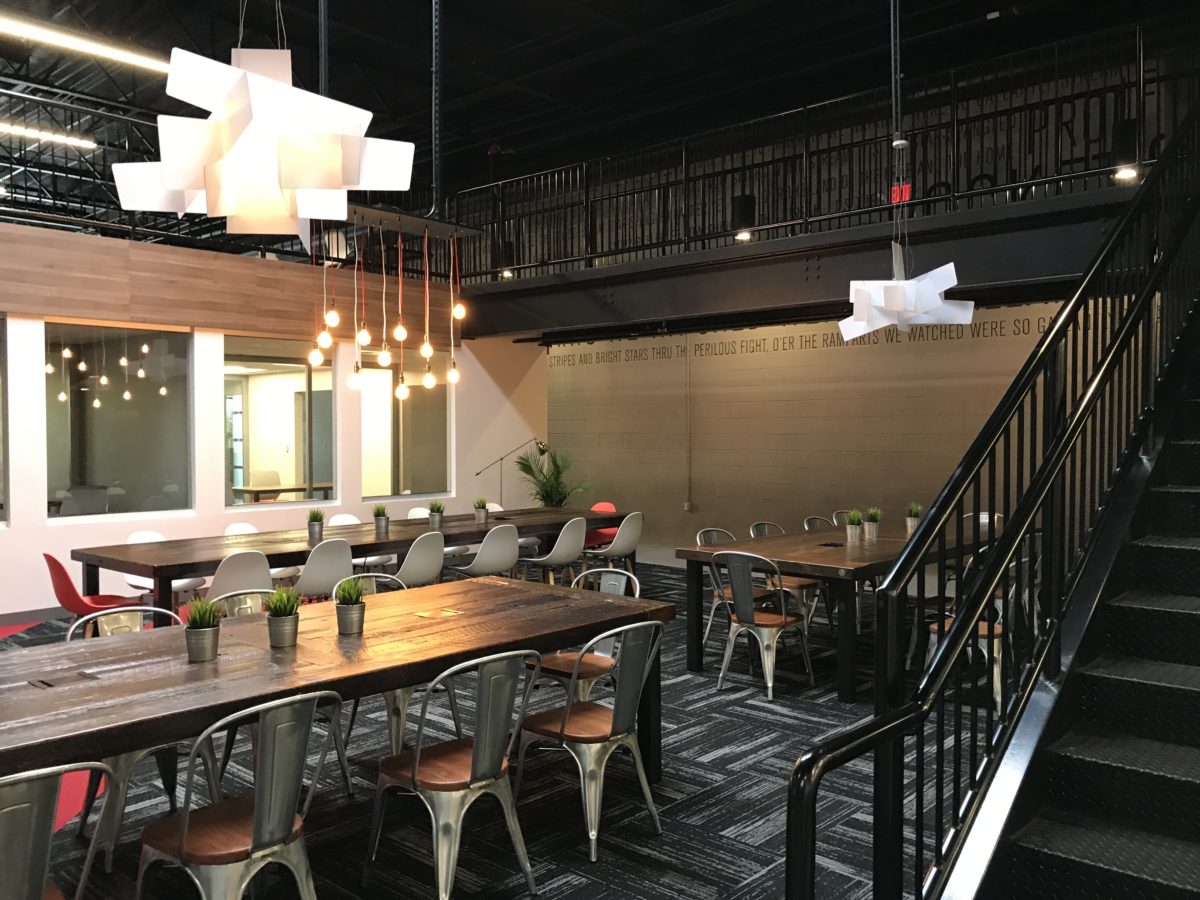As American city names and landmark photos flashed on the screen next to him during a LinkedIn livestream last week, Olive CEO Sean Lane was asked to describe why the healthcare AI company was choosing one of the cities for its first satellite office.
It’s a vibrant city, he said, adding, “We think it is a place where there’s a lot of talent.”
“It is near one of our biggest customers — one of our flagship customers where we have an incredible presence so we are already invested in this area,” Lane said. “We think that this area has a great geographic location where we can get in and out of it very quickly. It puts us somewhere we’re not.”
The city? Baltimore, Maryland.
The Columbus, Ohio-based company has an office that’s ready to go inside Betamore at Port Covington’s City Garage. It’s the first dedicated office that is part of a new distributed model that the company shifted to after the onset of the COVID-19 pandemic. Under this flexible work model, dubbed “The Grid,” the company’s employees can choose to work wherever they are most effective. Where there are clusters of 10 employees and major customers, Olive will open “substations,” which are satellite offices. Being the first such location, the more than 4,000-square-foot dedicated office that is Betamore’s largest at City Garage has been dubbed “Substation 001.”
Along with the strategic advantages, Lane said Baltimore had a lot of personal connection for him. The former NSA tech leader and Baltimore resident is one of the three cofounders of Betamore when the incubator launched in 2012, and is a cofounder of BTS Software Solutions.
“I am thrilled to have the opportunity to welcome him back to Baltimore to bring it all full circle,” said Greg Cangialosi, Betamore’s chairman and a fellow cofounder. “They also are a great example of a rapidly growing company that is challenging the healthcare industry. They recognize that Betamore and Baltimore are hubs for being able to attract great talent that want to grow by delivering innovative thinking in an industry that is traditionally slower to change.”
Olive says its “AI workforce” technology uses computer vision and machine learning to automate repetitive tasks and workflows for hospitals. The company has 300 employees, and closed a $51 million funding round at the end of March. Responding to follow-up questions, Chief Talent Officer Brian Rutkowski said the company’s model is built on “locking arms with our customers to develop, deploy and support a long term AI strategy.”
“Proximity makes that bond even stronger. From a talent perspective, Baltimore also has a thriving healthcare technology and data ecosystem and Betamore puts us right in the heart of that community,” he said. The company didn’t disclose the name of the “flagship customer” mentioned on the LinkedIn livestream, nor does its website.
The move reflects how the quick shift to remote work brought by the pandemic is leading to tech companies rethinking headquarters and hiring strategies in a more lasting way. Lane said the company had planned to keep expanding in Columbus, but the pandemic brought about the new strategy given the immediate health risks of clustering people together, and it opened up thinking about how remote work could help keep the effectiveness of small teams alive within a growing company, and how tech hubs can exist across the country.
“If you take that and extend it from coast to coast and you could put it in every small city or medium-sized city in the country, what you’re able to do is recruit and bring together this incredible team of diverse and really special talent,” he said.

The move to new, smaller offices with a more flexible work approach also present opportunity for existing shared workspaces to house them. Among companies at various stages of their lifecycle, Betamore has been home to various large corporations where employees can work apart from an HQ and away from home.
“While over the last several months we’ve seen a decline in the number of single coworkers, we have an influx of larger businesses, like Olive, wanting to start a flexible employee work model at Betamore,” Cangialosi said.
Olive’s office now serves as a hub for the 10 software and data engineers currently in Baltimore, with a focus on creative technologies. The company is aiming to add 10 more employees within six months, Rutkowski said. Going forward, Lane said he says he could see Olive having “a pretty major presence in Baltimore.”
Alongside opening an office and hiring local, the company is also looking to engage with the tech community, as well as being part of the wider community by giving back.
Lane described the company’s approach to cities beyond its HQ this way: “Our goal is to come in and learn what the identity of these places are and just try to do our best to help out with what they want to do and what they think is important, instead of us kind of deciding for them what we think is important.”







